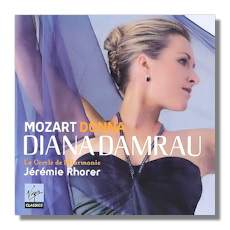
The Internet's Premier Classical Music Source
Related Links
- Mozart Reviews
- Latest Reviews
- More Reviews
-
By Composer
-
Collections
DVD & Blu-ray
Books
Concert Reviews
Articles/Interviews
Software
Audio
Search Amazon
Recommended Links
Site News
 CD Review
CD Review
Wolfgang Mozart

Donna
- Mitridate, rè di Ponto: "Al destin che la minaccia"
- Die Zauberflöte: "Ach, ich fühl's"
- Le nozze di Figaro:
- "Dove sono"
- "Giunse alfin il momento … Deh vieni, non tardar"
- La finta semplice: "Senti l'eco, ove t'aggiri"
- Die Entführung aus dem Serail:
- "Durch Zärtlichkeit und Schmeicheln"
- "Martern aller Arten"
- Vorrei spiegarvi, oh Dio!, K.418
- Don Giovanni:
- "Crudele? … Non mi dir"
- "In quali eccessi … Mi tradì"
- La clemenza di Tito:
- "S'altro che lagrime"
- "Ecco il punto … Non più di fiori"
- No, che non sei capace, K.419
Diana Damrau, soprano
Le Cercle de l'Harmonie/Jérémie Rhorer
Virgin Classics 212023-2 DDD 73:21
This is a follow-up to Damrau's debut CD, "Arie di bravura" (Virgin Classics 395250-2), which I also reviewed for Classical Net. It makes sense for Mozart to be the center of attention this time around, because the Metropolitan Opera featured the German singer both as Pamina and as the Queen of the Night (not on the same nights!) in their 2007-08 run of Die Zauberflöte. Also, she made her professional operatic debut in 1995 as Figaro's Barbarina.
Damrau, a lyric coloratura, might be compared to Austrian singer Rita Streich (1920-1987). Damrau's repertory (so far) is similar to Streich's, and their voices are similar. (I find Streich's sound to be richer, however.) She is an intelligent singer, and her voice seems more than capable of reliably doing her bidding. Her coloratura is more accomplished than exciting, but it doesn't let her (or Mozart) down.
As in Die Zauberflöte, Damrau here is given the opportunity to sing two roles from the same opera … actually, eight roles from four operas! From Figaro, we have both her Countess and Susanna, and from Die Entführung aus dem Serail, both Blonde and Konstanze. Although was born in 1971, Damrau continues to excel in soubrette roles, and I found her Susanna and Blonde to be more effective than the other member of the pair. This CD also presents her as both Servilia and Vitellia from Tito, and as both Donna Anna and Donna Elvira from Don Giovanni. Zerlina, I think, would have been the better fit, at least in this point in her career. She doesn't ascend the tragic heights of "Non mi dir," nor discover the crazy grandeur of "Mi tradì."Indeed, her Elvira sounds like a nice high school girl who has been stood up by her prom date. It is worth noting that, according to her website, she has performed none of these three roles on stage. Vitellia, Figaro's Countess, Mitridate's Aspasia, and La finta semplice's Rosina also remain untackled, except as excerpts. This is a soprano who seems to thrive in the presence of an audience, and less so in the recording studio. As a consequence, it is not surprising that her recordings of arias from roles outside of her current repertory are unfailingly interesting, but, in terms of drama, not consistently convincing. She does what she can to vary the color her voice, but sounding demure and innocent is what she does best, the Queen of the Night notwithstanding! Having said that, I feel compelled to repeat that the voice itself is a gorgeous one, and no one who loves vocalism per se will feel disappointed with this CD.
As on the previous disc, Damrau is accompanied by an orchestra of period instruments, conducted with energy – sometimes of the nervous kind – by Jérémie Rhorer. The "Cercle's" lean sound complements Damrau's voice, which is made to seem not very large. This must be an illusion, though, given her successful appearances at The Met and at La Scala, among other places.
The booklet contains texts and translations, an essay, and even a few words from Damrau herself, thanking her family and teachers, and expressing her intention to add more complete Mozart roles to her repertory. As long as her voice remains this good, the presumed maturation process promises much pleasure to her listeners.
Copyright © 2009, Raymond Tuttle




















